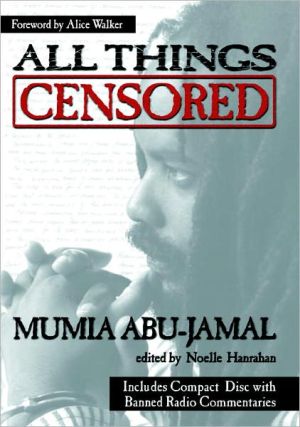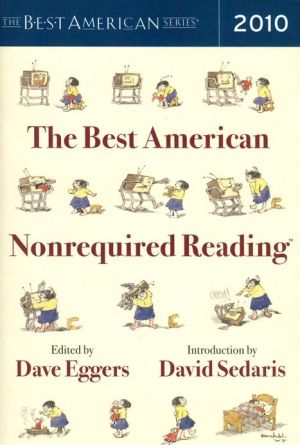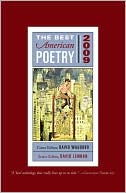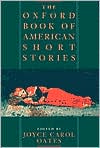All Things Censored [With CD]
More than 75 essays—many freshly composed by Mumia with the cartridge of a ball-point pen, the only implement he is allowed in his death-row cell—embody the calm and powerful words of humanity spoken by a man on Death Row. Abu-Jamal writes on many different topics, including the ironies that abound within the U.S. prison system and the consequences of those ironies, and his own case. Mumia's composure, humor, and connection to the living world around him represents an irrefutable victory over...
Search in google:
These 50 writings by jailed journalist Mumia Abu-Jamal include several recent pieces on censorship, justice, and the meaning of constitutional rights in America. Also included are the banned essays from Mumia's controversial tenure as on-air columnist for All Things Considered, and those that aired on Democracy Now over Pacifica Radio. Also included is a one-hour CD of Mumia Abu-Jamal reading his on-air pieces written for All Things Considered and commentary from Ossie Davis, Ruby Dee, Adrienne Rich, Howard Zinn, and many others.Publishers WeeklyTo some, Abu-Jamal, convicted in the 1981 murder of a Philadelphia police officer, is a cold-blooded cop killer, but to his supporters, the death-row inmate is a hero, wrongly condemned by a racist system. In this collection of forceful prison essays and radio talks written over the last decade (a sequel to Live from Death Row and Death Blossoms), former Black Panther Abu-Jamal maintains that he was targeted by the state because of his political beliefs and associations. He cites a recent Amnesty International report that calls for a new trial on the grounds that his 1982 trial was riddled with procedural errors and quite possibly contaminated by racism. Hanrahan, director of Prison Radio (which aired several of these commentaries after Abu-Jamal was pulled off the air by NPR's All Things Considered), describes Abu-Jamal's life in solitary confinement as a living hell and accuses prison authorities of constant harassment and censorship. Whatever one thinks of Abu-Jamal's guilt or innocence, his attack on capital punishment as a discriminatory, racist practice is compelling, as is his critique of our bloated prison system, which, according to an American Bar Association report cited here, is self-defeating because dehumanizing conditions produce more criminals. An outspoken political analyst, Abu-Jamal condemns Clinton's adoption of NAFTA, calls the war on drugs largely a "War on Blacks" and offers incisive commentary on rap music, the decline of African-American community life, police brutality and recent developments in Mexico, Peru, Iran and South Africa. (May) FYI: A CD accompanies the book, featuring Abu-Jamal's radio essays plus comments from Alice Walker, Cornel West, Martin Sheen, John Edgar Wideman and others. Copyright 2000 Cahners Business Information.\|
\ \ \ \ \ Chapter One\ \ \ NPR CENSORED\ FROM AN ECHO IN DARKNESS, A STEP INTO LIGHT\ \ \ I. From an Echo in Darkness, a Step into Light\ \ \ PSST!! YO, MU! Mu! You up?" asks the Italian-Cherokee tier runner, his accent betraying his South Philly roots. Stirring from the mattress, I trudge to the cell door, look down to where Mike stands, and glower at his bright face.\ "What's up, man?" I grumble at sleep's interruption.\ "You ready for this?" Mike asks rhetorically, his face ablaze with a smile.\ "Man, what's up?" I demand, a bit peeved at the wordplay.\ "Jay Smith?? He's going home!" Mike announced, and a heartfelt sense of happiness at another man's good fortune lifts my mood instantly.\ "No shit, Mike?"\ "Swear to God, Mu—he's packin' his gear right now. Sez he gotta order from the Supreme Court throwin' out his conviction! Ain't that somethin'?"\ "Yeah, Mike. That's somethin' wonderful! Long live John Africa! That's good news, man!"\ Jay Smith, a common, Anglo-Saxon, everyday American name, belonged to an old, quiet, gray-haired professional white dude who until recently was among 149 souls on Pennsylvania's death row after his conviction for three killings that sparked national attention, several books, and a television movie. Prosecutors, police, and the press painted him as an archdemon, a twisted sadist, a triple killer, and an all-around not-so-nice guy, light-years from the LowerMerion school principal and army reservist his neighbors and students knew.\ Having read a news article depicting him as cold and evil, with "goatlike" gray eyes, I half expected when I met him to see him bounding around on two cloven hooves. But on appeal, it appeared as if the real animals (skunks) sent him to death row, for the Supreme Court reversed his conviction, citing prosecutorial misconduct, and his lawyer steadily uncovered lying cops, hidden evidence, and secret deals between investigators and a Hollywood novelist for inside info on the case. His prosecutor, who rose to national office on his case, fell just as swiftly when arrested and convicted on cocaine-related charges.\ On Friday, September 18, 1992, at midday, the word came to Smith that his case was over; the prosecution was discharged; the defendant free to go. Having been encaged in Pennsylvania hellholes and on death row since 1979, Jay Smith packed his meager possessions, sent a few bye-byes around, shook off the ashes of twelve years, and walked away, stepping back into life. All the books, the multimillion-dollar movies of the week, and the damning news articles paled beside the reality of one man, walking from the stagnant cesspool of prison into freedom.\ When one reporter asked him about his plans, he replied, "I dunno. I've been fighting for so long for this that I hadn't planned for anything beyond. I'm sixty-four—maybe in a year I can collect social security?" But what "security" exists in a system that plotted, lied, connived, and hid evidence to destroy one man's life, his possessions, his family?\ \ \ II. Requiem for Norman\ \ \ MOST MEN ON B BLOCK called him by the honorific, "old-head," but he wasn't really "old" at fifty-four-odd years, although it must be admitted that, to the majority of young men in the prison, in their early twenties, Norm must've seemed old indeed, especially with his head covered with a tight cap of apparent white wool.\ Although his snowy head of hair bespoke age, his physique was that of a man half his age, well muscled and strong.\ He had exercised and stretched religiously for years.\ For seven years or so, Norman was held in the "hole."\ Because I listened to a bit of jazz in my youth, we could converse on the gifted artists of the genre, like King Pleasure, Betty Carter, John and Alice Coltrane, etc., with a degree of ease that others, of the rap/hip-hop era, could not. He was fiercely opinionated and delighted in a good argument. Although he grew up in New York, he spent time in Philly, and as a youth, summers with family in Virginia. Although a big-city guy at heart, the southern cadences of speech, stewed into him from Virginia summers, never left him, and several times someone, hearing his "down-home" bass, would wrongly assume his point of origin was in the deep South.\ He developed a habit that every time he left the cell, he would stop at the sergeant's desk for Gelusel, an antacid that he used for what seemed to be a constant upset stomach.\ One day he called down. "Call the Sarge! Oh! Tell 'em I needa doctor!! My stomach! Ohh," he grunted.\ Hearing the alarm in his voice, I called, and so did several others, "Dr. up! Sgt. up! 310 cellll! Dr. up!!"\ It took quite a while—perhaps forty-five minutes passed before a nurse appeared at his cell—but it made little substantive difference, for she recommended Tylenol, a common painkiller that Norm promptly panned as worthless.\ "Man, this stuff ain't doin' nothin' for my stomach!" he growled, the pain audible beneath the rumble of his voice.\ It took days for Norm to be taken to the hospital, and when he returned, two days later, the treatment seemed to have been as worthless as the Tylenol he took days before.\ "How'd it go, Norman?"\ "Aw, man, they talkin' 'bout they can't find nothin'," he replied.\ He continued to stop medical staff coming by to complain, and they took him out for more tests.\ About a week later, some guards came by to pack up his property, and to give the latest news on his health: Cancer. Cancer of the pancreas. Malignant.\ Two or three weeks after this diagnosis, Norman Whaley died in Centre County Hospital near Rockview Prison in Central Pennsylvania.\ More than anything in life he longed for freedom, the company of a woman, and the sweet summer sun of Virginia (perhaps sweetened a tad more by the scat of jazz great Betty Carter). To the government that caged his flesh for the last near-decade, the newspapers that he read occasionally, and the politicians he lambasted daily as "corrupt," Norman was a non-person, a number, someone to be ignored in death, as in life.\ To my knowledge, no newspaper recorded his death.\ No medium marked the passing of the "old-head."\ \ \ III. Yard In\ \ \ THE LAST "YARD" of the day is finally called. "Capitals! Fourth, fifth, and sixth tier—YARD UP!" the corpulent corrections officer bellows, his rural accent alien to the urban ear.\ One by one, cells are unlocked for the daily trek from cell to cage. Each man is pat-searched by guards armed with batons and then scanned by a metal detector.\ Once the inmates are encaged, the midsummer sky rumbles, its dark clouds swell, pregnant with power and water. A bespectacled "white shirt" turns his pale face skyward, examining nature's quickening portent. The rumbles grow louder as drops of rain sail earthward, splattering on steel, brick, and human.\ "Yard in!" the white shirt yells, sparking murmurs of resentment among the men.\ "Yard in? Shit, man, we just got out here."\ The guards adopt a cajoling, rather than a threatening, attitude. "C'mon, fellas—yard in, yard in. Ya know we can't leave y'uns out here when it gits ta thunderin' an' lightnin'."\ "Oh, why not? Y'all 'fraid we gonna get ourself electrocuted?" a prisoner asks.\ "Ain't that a bitch?" another adds. "They must be afraid that if we do get electrocuted by lightnin', they won't have no jobs and won't get paid."\ A few guffaws, and the trail from cage to cell thickens.\ Although usually two hours long, today's yard lasts ten minutes, for fear those condemned to death by the state may perish, instead, by fate.\ For approximately twenty-eight hundred people locked in state and federal prisons, life is unlike that in any other institution. These are America's "condemned," who bear a stigma far worse than "prisoner." These are America's death row residents: men and women who walk the razor's edge between half-life and certain death.\ You will find a blacker world on death row than anywhere else. African Americans, a mere 11 percent of the national population, compose about 40 percent of the death row population. There, too, you will find this writer.\ \ \ IV. "On Tilt" by State Design\ \ \ HARRY WASHINGTON shrieks out of an internal orgy of psychic pain: "Niggers!! Keep my family's name outcha mouf! Ya freaks! Ya filth! Ya racist garbage! All my family believe in God! Keep your twisted Satanic filth to y'allself! Keep my family's name outch'all nasty mouf!"\ I have stopped the reflexive glance down in front of Harry's cell. For now, as in all the times in the past, I know no one is out near his ground-level cell—I know Harry is in a mouth-foaming rage because of the ceaseless noises echoing within the chambers of his tortured mind. For Harry and I are among the growing numbers of Pennsylvanians on death row, and Harry, because of mind-snapping isolation, a bitterly racist environment, and the ironies, the auguries, of fate, has begun the slide from depression through deterioration to dementia.\ While we both share the deadening effects of isolation and an environment straight out of the redneck boondocks, Harry, like so many others, has slipped. Many of his tormenters here (both real and imagined) have named him "Nut" and describe him as "on tilt." Perhaps the cruel twists of fate popped his cork—who can say? A young black man, once a correctional officer, now a death row convict. Once he wore the keys, now he hears the keys, in an agonizing wait for death. The conditions of most of Americas death rows create Harry Washingtons by the score.\ Mix in solitary confinement, around-the-clock lock-in, no-contact visits, no prison jobs, no educational programs by which to grow, psychiatric "treatment" facilities designed only to drug you into a coma; ladle in hostile, overtly racist prison guards and staff; add the weight of the falling away of family ties, and you have all the fixings for a stressful psychic stew designed to deteriorate, to erode one's humanity—designed, that is, by the state, with full knowledge of its effects.\ Nearly a century ago, a Colorado man was sentenced to death for killing his wife. On his arrival at Colorado State Penitentiary, James Medley was placed in solitary. Medley promptly brought an original writ of habeas corpus in the U.S. Supreme Court, which in 1890 consisted of six Republicans and three Democrats. In the 1890 case, In re Medley, the Court reached back to old English law, to the early 1700s of King George II, to conclude that solitary confinement was "an additional punishment of the most important and painful character" and, as applied to Medley, unconstitutional.\ Fast-forward nearly a century to 1986, to the infamous federal court decision of Peterkin v. Jeffes, where Pennsylvania death row inmates sought to have solitary confinement declared unconstitutional, and one hears a judge deny relief, saying, in the immortal words of now chief justice Rehnquist, "Nobody promised them a rose garden," That is, solitary is okay.\ The notion that human progress is marked by "an evolving standard of decency," from the less civilized to the more civilized, from the more restrictive to the less restrictive, from tyranny to expanding freedom, dies a quick death on the rocks of today's Rehnquistian courts. Indeed, what other court could make the Republican-controlled Southern-Harlan-Fuller Court of the 1890s seem positively radical by comparison?\ Harry continues his howlings and mindless mutterings of rage at no one in particular.\ \ \ V. Control\ \ \ IT IS FROM PENNSYLVANIA'S largest death row at the State Correctional Institute at Huntingdon, in rural south-central Pennsylvania, that I write. In the Commonwealth I am but one of 123 persons who await death. I have lived in this barren domain of death since 1983. For several years now I have been assigned DC (disciplinary custody) status for daring to abide by my faith, the teachings of John Africa, and in particular for refusing to cut my hair. For this I have been denied family phone calls, and on occasion I have been shackled for refusing to violate my beliefs.\ Life here oscillates between the banal and the bizarre.\ Unlike other prisoners, death row inmates are not "doing time." Freedom does not shine at the end of the tunnel. Rather, the end of the tunnel brings extinction. Thus, for many here there is no hope.\ As in any massive, quasi-military organization, reality on the row is regimented by rule and regulation. As against any regime imposed on human personality, there is resistance, but far less than one might expect. For the most part, death row prisoners are the best behaved and least disruptive of all inmates. It also is true, however, that we have little opportunity to be otherwise, given that many death units operate on the "22 + 2" system: twenty-two hours locked in cell, followed by two hours of recreation out of cell. Outdoor recreation takes place in a cage, ringed with double-edged razor wire—the "dog pen."\ All death rows share a central goal: human storage in an austere world, in which condemned prisoners are treated as bodies kept alive to be killed. Pennsylvania's death row regime is one of America's most restrictive, rivaling the infamous San Quentin death unit for the intensity and duration of restriction. A few states allow four, six, or even eight hours out of cell, prison employment, or even access to educational programs. Not so in the Keystone State.\ Here one has little or no psychological life. Here many escape death's omnipresent specter only by way of common diversions—television, radio, or sports. TVs are allowed, but not typewriters: one's energies may be expended freely on entertainment, but a tool essential for one's liberation through the judicial process is deemed a security risk.\ One inmate, more interested in his life than his entertainment, argued forcefully with prison administrators for permission to buy a nonimpact, nonmetallic, battery-operated typewriter. Predictably, permission was denied for security reasons. "Well, what do y'all consider a thirteen-inch piece of glass?" the prisoner asked, "ain't that a security risk?"\ "Where do you think you'll get that from?" the prison official demanded.\ "From my TV!"\ Request for the typewriter denied.\ TV is more than a powerful diversion from a terrible fate. It is a psychic club used to threaten those who resist the dehumanizing isolation of life on the row. To be found guilty of an institutional infraction means that one must relinquish TV.\ After months or years of noncontact visits, few phone calls, and ever decreasing communication with one's family and others, many inmates use TV as an umbilical cord, a psychological connection to the world they have lost. They depend on it, in the way that lonely people turn to TV for the illusion of companionship, and they dread separation from it. For many, loss of TV is too high a price to pay for any show of resistance.\ \ \ VI. Already Out of the Game\ \ \ THE NEWEST POLITICAL FEVER sweeping the nation, the "three strikes, you're out" rage, will, barring any last-minute changes, become law in the United States, thereby opening the door to a state-by-state march to an unprecedented prison-building boom.\ What most politicians know, however, is what most people do not—that "three strikes, you're out" will do next to nothing to eradicate crime, and will not create the elusive dream of public safety.\ They also know that it will be years before the bills come due, but when they do, they'll be real doozies; by then, they reason, they'll be out of office, and it'll be another politician's problem. That's because the actual impact of "three strikes" will not be felt for at least ten to twenty years from now, simply because that's the range someone arrested today would face already (under the current laws), and the additional time, not to mention additional costs, will kick in then.\ It seems a tad superfluous to say that already some thirty-four states have repeat offender (so called Career Criminal) laws, which call for additional penalties on the second, not the third, felony in addition to the actual crime.\ As with every law, taxpayers will have to "pay the cost to be the boss." Pennsylvanians are paying over $600 million for their prisons; Californians, over $2.7 billion, topping costs for higher education. As prisons become increasingly geriatric, with populations hitting their fifties and sixties, these already atmospheric costs will balloon exponentially for expected health care costs, so that although many Americans, an estimated 37 million, don't have guaranteed health care, prisoners will, although of doubtful quality.\ Frankly, its always amazing to see politicians sell their "we-gotta-get-tough-on-crime" schtick to a country that is already the world's leading incarcerator, and perhaps more amazing to see the country buy it.\ One state has already trod that tough ground back in the 1970s; California "led" the nation in 1977 with their tough "determinate sentencing" law, and their prison population exploded over 500 percent; they now boast the largest prison system in the western world, 50 percent larger than the entire federal prison system. Do Californians—rushing to pass the "three strikes, you're out" ballot initiative—feel safer? A more cynical soul, viewing this prison-system-boom bill through the lens of economic interest, might suppose that elements of the correctional industry—builders, guards' unions, and the like—are fueling the boom, at least in part. Another element is the economy itself, where America enters the postindustrial age, when Japan produces the world's computer chips, Germany produces high performance autos, and America ... prisons.\ Prisons are where America's jobs programs, housing programs, and social control programs merge into a dark whole; and where those already outside of the game can be exploited and utilized to keep the game going.\ \ \ VII. Acting Like Life's a Ball Game\ \ \ WHEN I HEAR POLITICIANS bellow about getting tough on crime and barking out, "Three strikes, you're out," several images come to mind. I think of how quickly the tune changes when the politician is on the receiving end of some of the so-called toughness after a fall from grace. I am reminded of a powerful state appellate judge who, once caught in a bizarre web of criminal conduct, changed his long standing opinion regarding the efficacy of the insanity defense, an option he once ridiculed. It revealed in a flash how illusory and transitory power and status can be, and how we are all, after all, human.\ I also think of a young man I met in prison, one of the first wave of people imprisoned back in the 1970s under new tougher youth certification statutes that allowed teenagers to be sentenced as adults. The man, whom I'll call Rabbani, was a tall, husky fifteen-year-old when he was arrested in southeastern Pennsylvania for armed robbery. The prosecutor moved that he be judicially certified as an adult, and the court agreed. Tried as an adult, Rabbani was convicted of all charges and sentenced to fifteen-to-thirty years in prison for an alleged "robbery" with a CO2-air pistol.\ His first six or seven years in this manmade hell found him constantly locked in battles with guards, and he logged more years in "the hole" than he did in general population status. He grew into manhood in shackles, and every time I saw him, he seemed bigger in size but more bitter in spirit. When we took the time to converse, I was always struck by the innate brilliance of the young man—a brilliance immersed in a bitterness so acidic that it seemed capable of dissolving iron. For almost fifteen years, this brilliance had been caged in cubes of time and steel.\ For almost two of those years he tried, largely in vain, to get a judge to reconsider his case, but the one-line, two-word rejections—"appeal denied"—only served to deepen his profound cynicism. For those critical years, from age fifteen to thirty, which mark the transition from boy to man, Rabbani was entombed in a juridical, psychic, temporal box branded with the false promise "corrections." Like tens of thousands of his generation, his time in hell equipped him with no skills of value to either himself or his community.\ He has been "corrected" in precisely the same way that hundreds of thousands of others have been, that is to say, warehoused in a vat that sears the very soul. He has never held a woman as a mate or lover; he has never held a newborn baby in his palm, its heart athump with new life; he hasn't seen the sun rise, nor the moon glow, in almost fifteen years. For a robbery, "armed" with a pellet gun, at fifteen years of age.\ When I hear such easy, catchy, mindless slogans a "Three strikes, you're out," I think of men like Rabbani, who had one strike, if not one foul, and are for all intents and purposes already outside any game worth playing.\ \ \ VIII. Pennsylvania Takes a Giant Step—Backward\ \ \ FOR THE SECOND TIME in as many years, the Pennsylvania Senate has passed a bill that would change the manner of executions from electrocution to lethal injections. Pennsylvania's House Judiciary Committee also passed the measure. In so doing, Pennsylvania begins the process that may add it to nineteen states that prescribe lethal injections, and takes a big step backwards. The bill's sponsor, Judiciary Committee Chair Stewart J. Greenleaf, pointed to other states as one reason for the act. Another, said Senator Greenleaf, was that it's "a more humane way." Pennsylvania's ACLU, in opposing the bill, said, "There is no humane way for the state to take a human life."\ Back in 1888, New York State rejected lethal injection and hanging in favor of the more "humanitarian" method, electrocution.\ A century ago, electricity was a mystery.\ A popular publication of the age, Frank Leslie's Illustrated Newspaper (June 8, 1889), detailed the upcoming execution of William I. Kemmler by electricity with the breathless prose of a shameless ad man. Calling electricity a "more humane" method of execution, the dusty tabloid inferred Kemmler was, in a macabre sense, lucky, as he "need fear no such bungling work [as prior hangings] since he ... will be executed by the Westinghouse alternating current during the week commencing June 24th."\ The 1889 article, complete with a crude sketch of the new device, describes Kemmler's killing as a case of "no muss, no fuss." "At first a perceptible stiffening of the muscles is noticed, which gradually passes away; there is no struggle or outcry, and when, in fifteen seconds, the switch is opened, all signs of life are gone."\ A grim experiment, using AC current, was declared a "success" on August 6, 1890, at Auburn Prison, New York, and Kemmler was killed. Such is "progress."\ Today, 100 years later, a "new and improved" method of legal murder comes to the Keystone State, again touted by pols as "more humane." James Autry, were he alive, might beg to differ.\ Autry, late of Texas, was put to death on March 14, 1984, and according to Newsweek "took at least 10 minutes to die and throughout much of that time was conscious, moving about and complaining of pain" (April 9, 1984). So much for "progress."\ Legal scholars Franklin E. Zimring and Gordon Hawkins in their 1986 book Capital Punishment and the American Agenda (Cambridge University Press) trace the revival of the lethal injection movement to none other than then California governor Ronald Reagan, who remarked in 1973, "Being a former farmer and horse raiser, I know what it's like to try to eliminate an injured horse by shooting him. Now you call the veterinarian and the vet gives it a shot and the horse goes to sleep—that's it. I myself have wondered if maybe this isn't a part of our problem [with capital punishment], if maybe we should review and see if there aren't even more humane methods now—the simple shot or tranquilizer."\ From Death Valley Days to Death Tally Ways, a mediocre actor, using a cowboyish analogy, strikes political pay dirt. As the island enchantress Circe of ancient Greek myth changed seamen into swine, so now does the state transform people enmeshed in the death penalty process into "wounded cattle." So lethal injection returns, after a century's hiatus. What's next for these political showmen, when this latest trick fails to properly entertain the throng?\ A cup of hemlock?\ \ \ From death row, this is Mumia Abu-Jamal.
Acknowledgments12Foreword15Introduction: Lethal Censorship21ScenesFrom an Echo in Darkness, a Step into Light: NPR Censored34The Sense of Censory49Another Write-Up ... for Rapping!51A Bright, Shining Hell55No Law, No Rights57A Letter from Prison59The Visit61Black August63A Single Spark Can Start a Prairie Fire66Meeting with a Killer69Manny's Attempted Murder71Days of Pain, Night of Death73An Uncivil Action76PerspectivesMother Loss and Father Hunger96Musings on "Mo" and Marshall100Philly Daze103Words from an Outcast from the Fourth Estate105Deadly Drug Raid118First Amendment Rites120A Rap Thing124PEN Award Acceptance Speech126Absence of Power128A Crisis in Black Leadership130Liberty Denied in Its Cradle132Slavery Daze II135Memories of Huey137To War! For Empire!140Capture Him, Beat Him, and Treat Him Like Dirt142The Lost Generation?144May 13 Remembered146And They Call MOVE "Terrorists"!150Justice Denied153Justice for Geronimo Stolen by Star Chamber157Eddie Hatcher Fights for His Life!160Seeds of Wisdom162Sweet Roxanne164A House is Not a Home166Men of Cloth168Prisons vs. Preschools171Raised Hope, Fallen Disappointment173With Malice toward Many175Legalized Cop Violence177A Drug that Ain't a Drug180How, Now, Mad Cow?182Essays on JusticeDe Profundis194Five Hundred Years: Celebrations or Demonstrations?196The Illusion of "Democracy"198A Nation in Chains200Live from Death Row202War on the Poor205Why a War on the Poor?207The Death Game209Black March to Death Row213On Death Row, Fade to Black215Fred Hampton Remembered219"Law" That Switches from Case to Case221Two Blacks, Two Georgians223Cancellation of the Constitution225L. A. Outlaw227Media is the Mirage229True African-American History231When Ineffective Means Effective233Death: The Poor's Prerogative?235Legalized Crime237Campaign of Repression: Attack on the Life of the Mind239Musings on Malcolm242In Defense of Empire244Build a Better Mousetrap246Haitians Need Not Apply248Rostock, Germany, and Anti-Immigrant Violence250NAFTA: A Pact Made in Hell252Fujimori Bans in Bar in Peru254South Africa256Warlust - Again! (Iraq II)258What, to a Prisoner, is the Fourth of July?260A Death Row Remembrance of the Rosenbergs - Never Again?262Expert Witness from Hell264Zapatista Dreams266What Made the Acteal Massacre Possible??269New EssaysFather's Love: Father's Loss272Brahin: Reporter of the First Order275The Liebman Report: Broken Death Machines277Snatch and Grab in Central Park279Another Law - Another Country281Another Philadelphia Story: Cops Wilding284Killing Kids: Shaka and International Law286Echoes of Osage288Defense Lawyer for the Prosecution290WBAI: The Coup on Wall Street292Teaching Oppression294Speech to the Antioch College Graduating Class: April 29, 2000297Outside Agitators300Conversation Between Mumia and Noelle Hanrahan minutes after the 1995 Death Warrant was read to Mumia in his cell303Notes on the composition and recording of the texts311The Case of Mumia Abu-Jamal320About the Authors332Credits335
\ Publishers Weekly - Publisher's Weekly\ To some, Abu-Jamal, convicted in the 1981 murder of a Philadelphia police officer, is a cold-blooded cop killer, but to his supporters, the death-row inmate is a hero, wrongly condemned by a racist system. In this collection of forceful prison essays and radio talks written over the last decade (a sequel to Live from Death Row and Death Blossoms), former Black Panther Abu-Jamal maintains that he was targeted by the state because of his political beliefs and associations. He cites a recent Amnesty International report that calls for a new trial on the grounds that his 1982 trial was riddled with procedural errors and quite possibly contaminated by racism. Hanrahan, director of Prison Radio (which aired several of these commentaries after Abu-Jamal was pulled off the air by NPR's All Things Considered), describes Abu-Jamal's life in solitary confinement as a living hell and accuses prison authorities of constant harassment and censorship. Whatever one thinks of Abu-Jamal's guilt or innocence, his attack on capital punishment as a discriminatory, racist practice is compelling, as is his critique of our bloated prison system, which, according to an American Bar Association report cited here, is self-defeating because dehumanizing conditions produce more criminals. An outspoken political analyst, Abu-Jamal condemns Clinton's adoption of NAFTA, calls the war on drugs largely a "War on Blacks" and offers incisive commentary on rap music, the decline of African-American community life, police brutality and recent developments in Mexico, Peru, Iran and South Africa. (May) FYI: A CD accompanies the book, featuring Abu-Jamal's radio essays plus comments from Alice Walker, Cornel West, Martin Sheen, John Edgar Wideman and others. Copyright 2000 Cahners Business Information.\|\ \ \ \ \ BooknewsMumia Abu-Jamal is an award-winning journalist who was elected president of the Philadelphia chapter of the Association of Black Journalists in 1981. His 1982 murder trial and conviction has been contested on various constitutional, legal, and moral grounds. The title of this collection of 79 essays from death row alludes to Mumia's hiring as an on-air columnist by National Public Radio's "All Things Considered," and his subsequent banning from that venue under pressure from law and order groups. An accompanying CD contains readings by Mumia and other writers and activists, including Adrienne Rich, Martin Sheen, and Alice Walker. Includes b&w photos. Annotation c. Book News, Inc., Portland, OR (booknews.com)\ \








